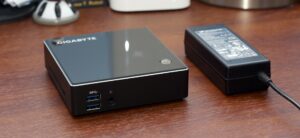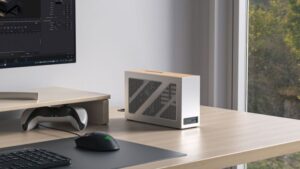In today’s fast-paced world, technology continues to shrink in size while expanding in capabilities. One such marvel of modern engineering is the Mini PC. These diminutive devices are redefining the way we think about computing, packing impressive processing power into a compact form factor. In this article, we will delve into the world of Mini PCs, exploring their features, benefits, and the growing importance of these tiny titans in our daily lives.

The Rise of the Mini PC
Traditional desktop computers have always been associated with bulky towers and sprawling peripherals, taking up valuable desk space and often requiring dedicated rooms or corners. However, with the advent of Mini PCs, this paradigm is shifting. These small, unassuming boxes are designed to fit comfortably in any environment, be it your home office, living room, or even on the go.
Key Features of Mini PCs
Compact Form Factor: The defining characteristic of a Mini PC is its size. These devices are significantly smaller than conventional desktops, with dimensions typically ranging from a few inches to a few liters in volume. This compact form factor ensures they can be tucked away neatly or mounted behind a monitor, saving space and reducing clutter.
Powerful Performance: Despite their small size, Mini PCs are no slouch when it comes to performance. Many models are equipped with powerful processors, sufficient RAM, and dedicated graphics cards, making them capable of handling demanding tasks such as video editing, gaming, and 3D rendering.
Energy Efficiency: Mini PCs are often more energy-efficient than their larger counterparts. They consume less power, which not only reduces your electricity bill but also contributes to a greener environment.
Portability: Mini PCs are designed for portability. They are lightweight and easy to transport, making them an excellent choice for those who need computing power on the go, such as business travelers or digital nomads.
Customizability: Many Mini PCs are customizable, allowing users to upgrade components like RAM and storage to meet their specific needs. This flexibility ensures that your Mini PC can grow with you as your computing requirements evolve.
Connectivity: Despite their size, Mini PCs are equipped with a wide range of connectivity options, including USB ports, HDMI outputs, audio jacks, and more. This versatility allows you to connect to various peripherals and accessories seamlessly.

Use Cases for Mini PCs
Home Theater PCs (HTPCs): Mini PCs are perfect for creating a home entertainment hub. With their small footprint and powerful processors, they can handle 4K video streaming, gaming, and serve as a central media server.
Office and Productivity: Mini PCs are ideal for office environments where space is limited. They can run productivity software, handle multitasking, and connect to dual monitors for enhanced productivity.
Gaming: Some Mini PCs are specifically designed for gaming. They offer a compact alternative to gaming laptops, with the added advantage of upgradeability.
Education: Mini PCs are increasingly finding their way into educational settings, providing students with a compact yet capable computing solution for learning and research.
Conclusion
In an era where the demand for smaller, more efficient, and yet powerful computing solutions is on the rise, the Mini PC has emerged as a game-changer. These compact devices are redefining the way we think about desktop computing, offering a versatile and space-saving alternative to traditional PCs.
Whether you’re a gamer, a creative professional, or simply looking to maximize your workspace, the Mini PC is worth considering. Its blend of power, portability, and customization options makes it a compelling choice for a wide range of users. As technology continues to advance, we can only expect Mini PCs to become even more capable, cementing their place in the world of computing.


